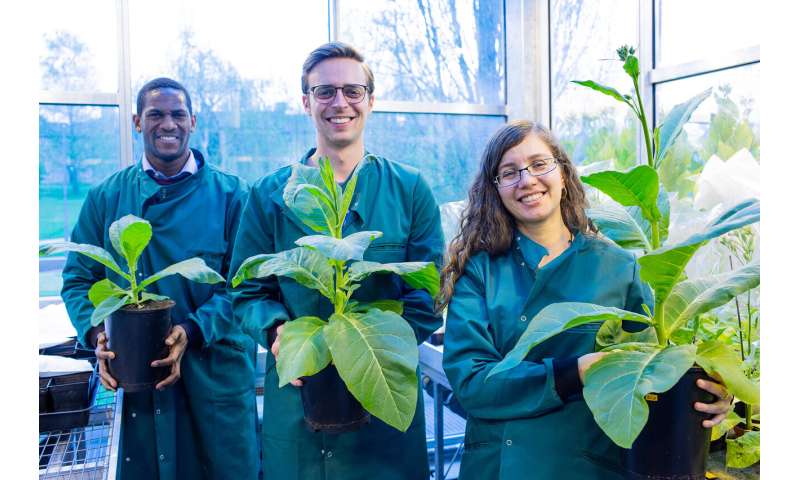#Third breakthrough demonstrates photosynthetic hacks can boost yield, conserve water
“#Third breakthrough demonstrates photosynthetic hacks can boost yield, conserve water”

Plants are factories that manufacture yield from light and carbon dioxide—but parts of this complex process, called photosynthesis, are hindered by a lack of raw materials and machinery. To optimize production, scientists from the University of Essex have resolved two major photosynthetic bottlenecks to boost plant productivity by 27 percent in real-world field conditions, according to a new study published in Nature Plants. This is the third breakthrough for the research project Realizing Increased Photosynthetic Efficiency (RIPE); however, this photosynthetic hack has also been shown to conserve water.
“Like a factory line, plants are only as fast as their slowest machines,” said Patricia Lopez-Calcagno, a postdoctoral researcher at Essex, who led this work for the RIPE project. “We have identified some steps that are slower, and what we’re doing is enabling these plants to build more machines to speed up these slower steps in photosynthesis.”
The RIPE project is an international effort led by the University of Illinois to develop more productive crops by improving photosynthesis—the natural, sunlight-powered process that all plants use to fix carbon dioxide into sugars that fuel growth, development, and ultimately yield. RIPE is supported by the Bill & Melinda Gates Foundation, the U.S. Foundation for Food and Agriculture Research (FFAR), and the U.K. Government’s Department for International Development (DFID).
A factory’s productivity decreases when supplies, transportation channels, and reliable machinery are limited. To find out what limits photosynthesis, researchers have modeled each of the 170 steps of this process to identify how plants could manufacture sugars more efficiently.
In this study, the team increased crop growth by 27 percent by resolving two constraints: one in the first part of photosynthesis where plants transform light energy into chemical energy and one in the second part where carbon dioxide is fixed into sugars.
Inside two photosystems, sunlight is captured and turned into chemical energy that can be used for other processes in photosynthesis. A transport protein called plastocyanin moves electrons into the photosystem to fuel this process. But plastocyanin has a high affinity for its acceptor protein in the photosystem so it hangs around, failing to shuttle electrons back and forth efficiently.
The team addressed this first bottleneck by helping plastocyanin share the load with the addition of cytochrome c6—a more efficient transport protein that has a similar function in algae. Plastocyanin requires copper and cytochrome requires iron to function. Depending on the availability of these nutrients, algae can choose between these two transport proteins.
At the same time, the team has improved a photosynthetic bottleneck in the Calvin-Benson Cycle—wherein carbon dioxide is fixed into sugars—by bulking up the amount of a key enzyme called SBPase, borrowing the additional cellular machinery from another plant species and cyanobacteria.
If you want to read more Like this articles, you can visit our Science category.
if you want to watch Movies or Tv Shows go to Dizi.BuradaBiliyorum.Com for forums sites go to Forum.BuradaBiliyorum.Com



